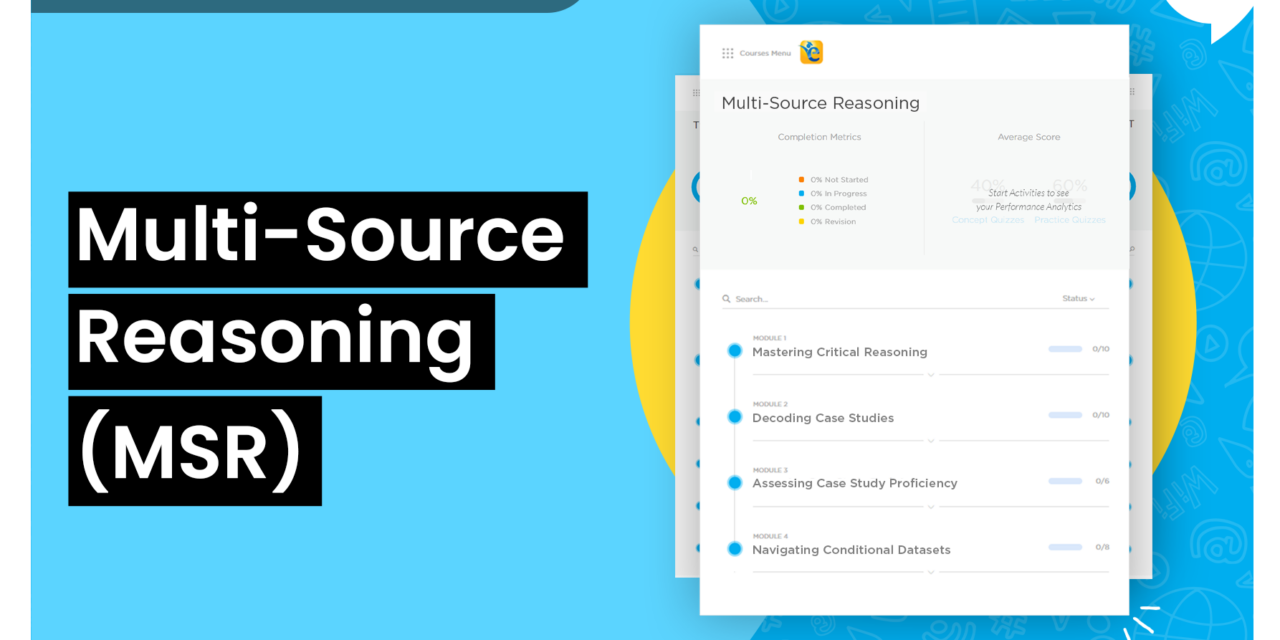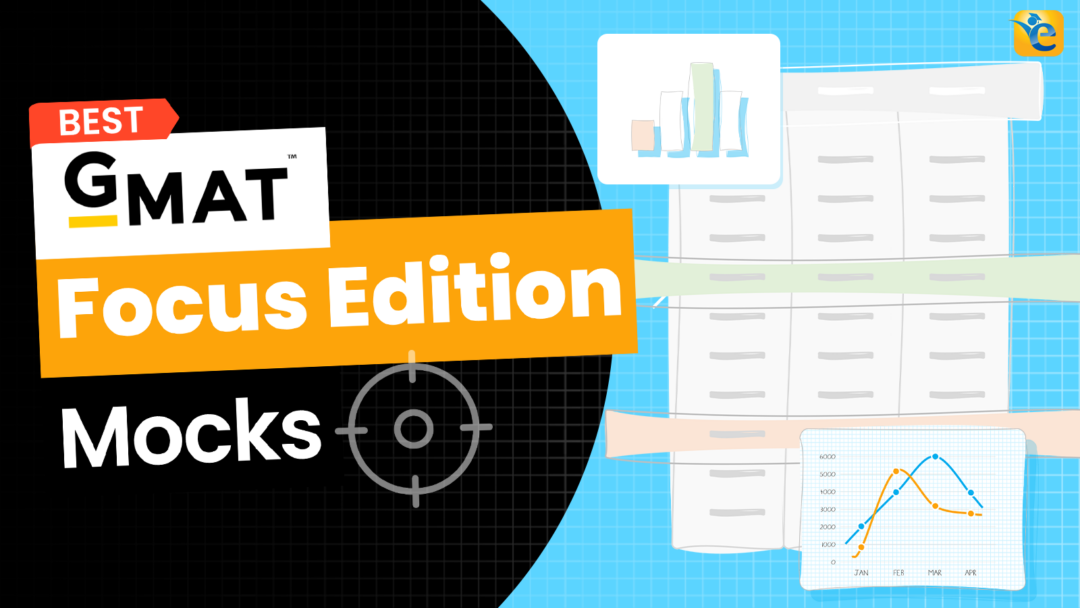Introduction
In the Data Insights section of the GMAT Focus Edition, the Multi-Source Reasoning (MSR) section is considered to be the most challenging. Quite often, it can be the difference between a 100th percentile score (scaled score of 90) and a 90th percentile score (scaled score of 81). Designed to test a range of cognitive and analytical skills, this section necessitates an intricate balance of data interpretation, information synthesis, critical reasoning, and informed decision-making.
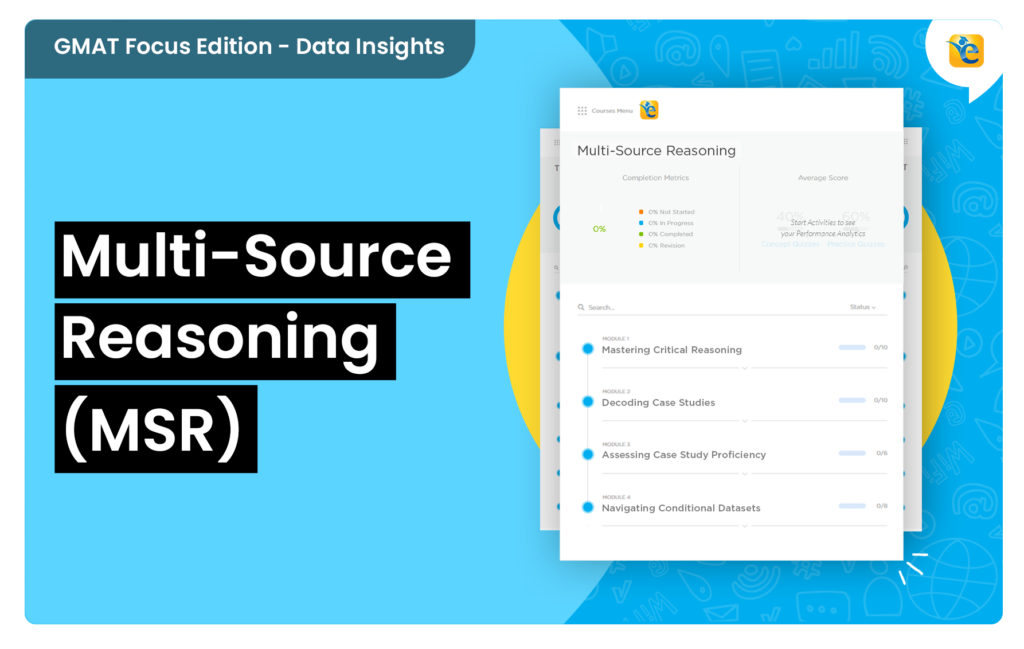
With its two-fold philosophy aimed at academic achievement and practical business skills, e-GMAT’s MSR course provides a robust pathway to conquer these hurdles and excel beyond them. The course not only targets acing the GMAT but also fosters the ability to make data-driven decisions, an essential skill in our data-intensive business landscape.
Watch this video to learn about key MSR skills:
Did you know that a high GMAT score can increase your chances of admission to your dream B-school? Here is how we can help:
Skills that Data Insights tests – Key MSR Skills
Data Interpretation and Analysis:
This foundational component of the MSR course imparts learners the skill to comprehend, interpret, and dissect complex data from myriad sources. It aids students in identifying central ideas, discovering links between various data points, and recognizing crucial details. These skills are not only indispensable for tackling the MSR questions in the DI section but are also integral in navigating the modern business world.
Information Synthesis:
Given its pivotal role in connecting disparate data points to form a coherent picture, the ability to synthesize information forms a significant part of the course. This skill prepares learners to discern relationships, draw inferences, and select the most appropriate problem-solving strategy from the synthesized data. Mastery of information synthesis is a potent tool for both acing MSR questions and excelling in real-life data-driven business scenarios.
Critical Reasoning:
Both GMAT success and effective business decision-making hinge on critical reasoning. This ability to assess arguments, make logical inferences, and draw relevant conclusions is a skill set that the MSR course hones meticulously. By instilling critical thinking, the course equips learners with the capacity to evaluate the credibility of information, understand underlying assumptions, and discern cause-and-effect relationships – critical attributes for gaining an edge in the DI section and beyond.
Decision Making:
Rounding off the course is the fundamental skill of decision-making. Learners are trained to apply their newly acquired knowledge to make well-considered decisions, mirroring real-world scenarios where data interpretation, information synthesis, and critical reasoning converge to influence data-driven decisions.
Start your GMAT Focus journey with our free GMAT Focus mock test to gauge your baseline score, and then create a personalized study plan. Dive into our free trial for targeted prep. Trusted by thousands with 2600+ reviews on GMAT Club, e-GMAT is your partner in mastering the GMAT. Contact us at support@e-gmat.com for expert guidance.
Commonly Asked Questions
Q1 -When should I study the MSR course?
Multi Source Reasoning (MSR) tests a variety of skills that you learn in Quant and Verbal modules. We recommend that you undertake e-GMAT’s MSR course after reaching your target abilities (or at least 70th percentile ability) in the Verbal and Quant courses. Read below to learn why.
The Verbal course arms you with the necessary comprehension and Critical Reasoning skills, such as inference and evaluation, which are key for tackling the MSR questions. Similarly, the Quant course imparts crucial quant skills such as understanding median, mean, weighted average, and more, which are integral for data analysis in MSR.
Furthermore, we recommend completing the Table Analysis and Graphics Interpretation before diving into MSR. This course familiarizes you with various chart types and introduces important concepts such as correlation, which are pivotal for interpreting and synthesizing information from multiple sources in MSR.
Q2- How many Datasets are in the MSR course?
The e-GMAT’s Multi Source Reasoning (MSR) course includes around 40 datasets. Accompanied by approximately 160 practice questions, these datasets offer ample opportunities to apply and reinforce the skills and strategies you’ve learned throughout the course, ensuring you’re thoroughly prepared for the MSR questions on the GMAT.
Q3- Creating MSR questions is really challenging. How close are these questions to those tested on the real GMAT?
e-GMAT’s Multi Source Reasoning (MSR) questions have been meticulously crafted to echo the nature of questions one would encounter on the actual GMAT, while still possessing a unique identity. They are representative of the GMAT because we ensure that they evaluate the same concepts, mimic the same tricks, and test the same skills that the official GMAT questions do.
Our approach is methodical and rigorous: before designing an MSR question, we scrutinize numerous GMAT questions, from which we construct a matrix of skills that are tested in the official version. Following this, we decide on the skills that we wish to evaluate within a specific set of questions and proceed with their creation.
Despite their representative nature, our questions also stand apart. We achieve this distinctiveness by using contexts and language in our questions that are markedly different from those in the GMAT. In essence, the official GMAT questions provide us with two crucial points of reference: the matrix of skills that are being evaluated, and the level of difficulty to which these skills are tested.
Although this rigorous process is time-consuming, often taking approximately 10 hours to finalize a dataset, it ensures that our students are challenged appropriately. Only those who truly possess the necessary skills will excel on our questions, making e-GMAT’s MSR course an effective and realistic preparatory tool for the GMAT.
Course Structure
The course unfolds through four modules, each designed to cultivate specific skills:
Watch this video to understand the e-GMAT’s MSR Course structure:
Module 1: Mastering Critical Reasoning
In the first module, the focus is on mastering Critical Reasoning (CR), an essential part of GMAT success and effective decision-making. This section helps learners assess arguments, construct logical inferences, and draw relevant conclusions. By bolstering critical thinking, learners are better equipped to evaluate the credibility of information, understand underlying assumptions, and discern cause-and-effect relationships. This skill offers a significant advantage in the DI section of the GMAT, where CR often forms the basis of the challenging MSR questions.
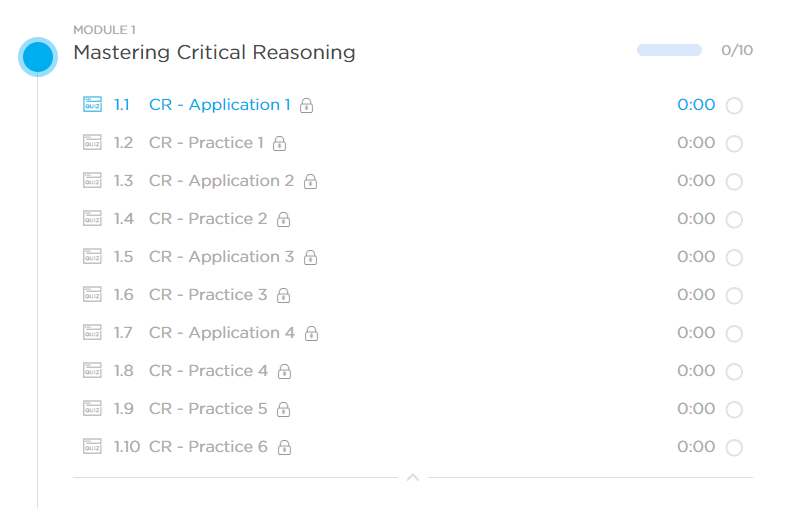
Module 2: Decoding Case Studies
Building on the foundation of critical reasoning, Module 2 shifts the focus toward the practical application of these skills. Here, the course dives into various case studies to enable learners to practice and apply their CR skills in various contexts. Each case study is carefully curated to challenge learners and to help them identify central ideas, discover links between various data points, and recognize crucial details, thereby simulating the complexity of the DI section’s MSR questions.
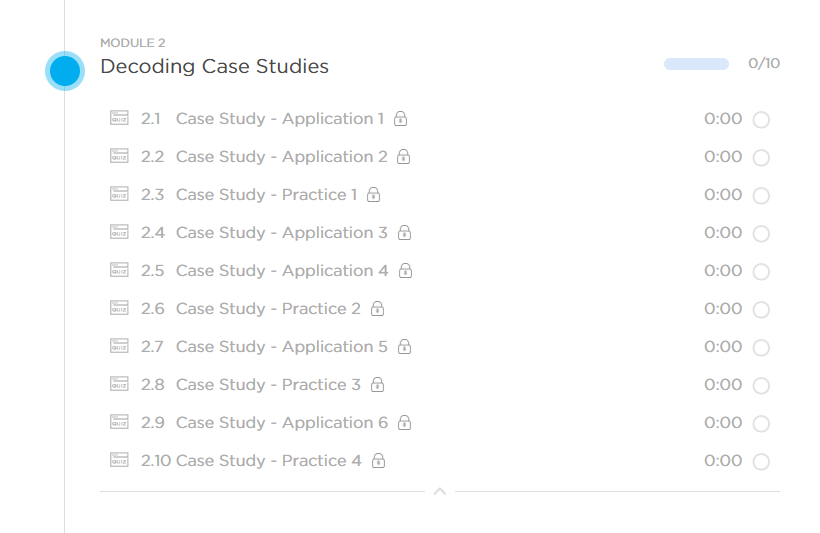
Module 3: Assessing Case Study Proficiency
This module presents an advanced level of case study analysis, providing learners an opportunity to evaluate their proficiency in tackling MSR-style questions. By working through a series of advanced case studies, learners can assess their ability to synthesize information, form a holistic picture from disparate data points, and select the most appropriate problem-solving strategy from the synthesized data. This module ultimately builds a bridge between the theory and practice of information synthesis.
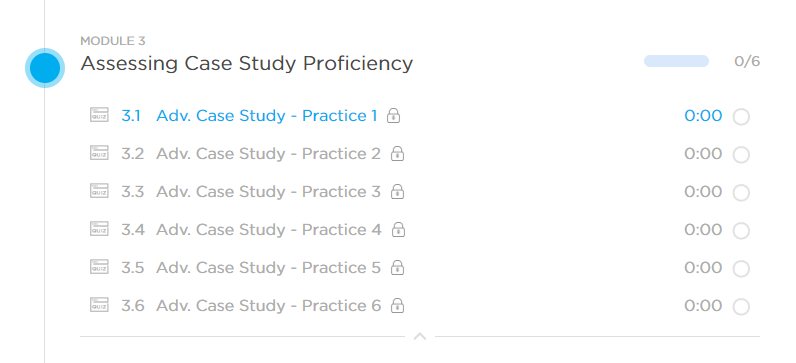
Module 4: Navigating Conditional Datasets
In the final module, the emphasis is on navigating conditional datasets. Learners are introduced to the intricacies of interpreting complex data and making informed decisions based on their interpretations. Here, they can practice their skills of data interpretation, information synthesis, and decision-making in a safe, controlled environment, thus preparing them for the type of scenarios they will encounter in the GMAT’s DI section and real-world business settings.
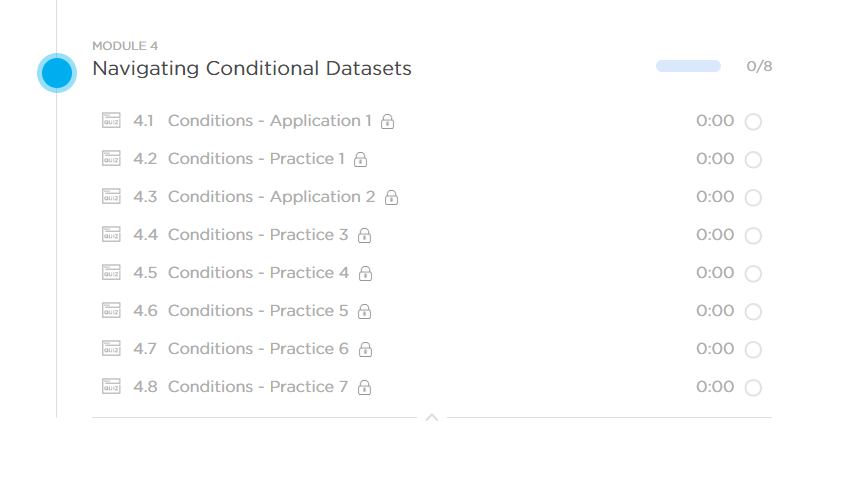
Conclusion : Multi-Source Reasoning
Overall, the goal of e-GMAT’s MSR course is to offer a comprehensive and well-structured program that serves a dual purpose. On the one hand, it is meticulously crafted to equip learners with the knowledge, skills, and confidence needed to excel in the challenging Data Insights section of the GMAT, particularly the Multi-Source Reasoning questions. On the other hand, it is designed to serve as a springboard for learners’ future business careers, where making data-driven decisions in complex, real-world scenarios is paramount.
Ready to tackle the GMAT Focus Edition? e-GMAT offers a Personalized Study Planner and top-notch Free GFE mock exam to help you prepare effectively. As the most reviewed GMAT prep company on GMAT Club with 2600+ reviews we’re here to support your GFE journey. Take advantage of our free trial with the best quality content. Start your path to success today!


